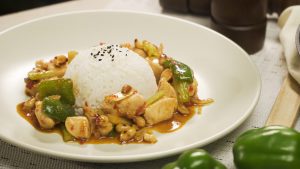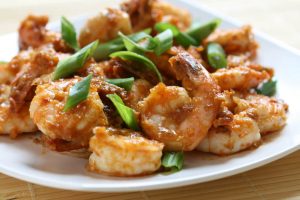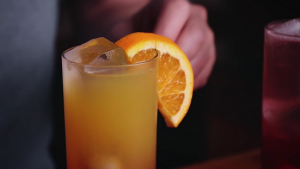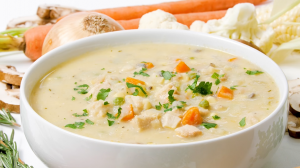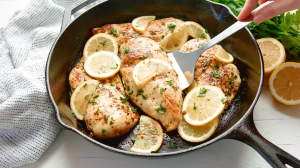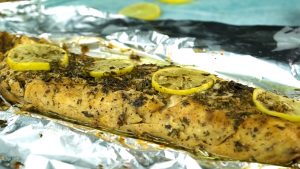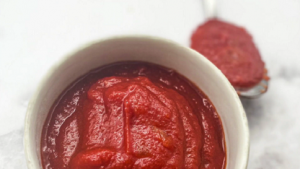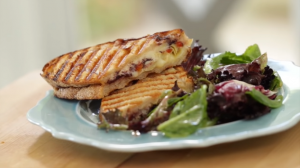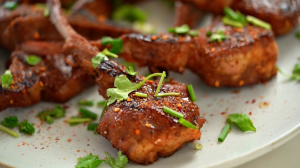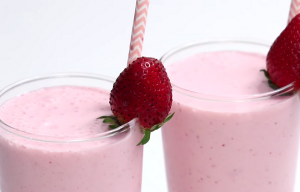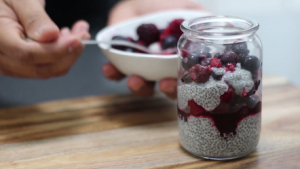Ready to take your weekly meal prep to the next level of flavor and nutrition? Then this Kung Pao Chicken with Zucchini Noodles is just what you need! This recipe is a healthier take on the classic Chinese dish, balancing the bold flavors of Kung Pao with the lightness and freshness of zucchini noodles. It's a meal you'll find both satisfying and guilt-free.
The ingredients for this recipe are mostly pantry staples, but there are a few items like sambal oelek red chili paste, hoisin sauce, and a spiralizer or mandolin for zucchini noodles which may not be readily available in your home. Sambal oelek, a spicy Southeast Asian chili sauce, and hoisin, a sweet and savory Chinese sauce, can be found in the international or Asian section of most supermarkets. A spiralizer or mandolin is a kitchen tool that you might need to invest in if you plan to make vegetable noodles often.
Key Ingredients for Kung Pao Chicken with Zucchini Noodles
Zucchini: The zucchini is spiralized into noodles for a low-carb, nutrient-rich alternative to traditional noodles.
Chicken breasts: Lean protein that will be cooked and coated with a flavorful sauce.
Red bell pepper: Adds a bright, sweet crunch to the dish.
Garlic: Gives a strong flavor foundation to the sauce.
Ginger: Provides a warm, spicy undertone to the dish.
Dry roasted peanuts: Adds a satisfying crunch and nutty flavor.
Scallions: Used for garnish, providing a fresh, sharp flavor contrast.
Soy sauce: Adds a deep, salty umami flavor to the sauce.
Balsamic vinegar: Gives the sauce a tangy sweetness.
Hoisin sauce: Contributes a sweet and tangy flavor to the sauce.
Sambal oelek red chili paste: Brings heat to the dish.
Sugar: Balances the heat and saltiness of the other sauce ingredients.
Cornstarch: Thickens the sauce so it clings to the chicken and noodles.
One reader, Elvera Ocasio says:





This kung pao chicken with zucchini noodles recipe is a game-changer! The flavors are incredible, and the zucchini noodles add a healthy twist. It's a perfect blend of spicy and savory, and the texture of the peanuts adds a delightful crunch. I highly recommend trying this recipe!
Techniques Required
How to spiralize zucchini: Use a spiralizer with the thickest noodle blade or a mandolin fitted with a julienne blade to cut the zucchini into long spaghetti-like strips. If using a spiralizer, use kitchen scissors to cut the strands into pieces that are about 6 to 8 inches long.
How to make the sauce: In a small bowl, whisk together soy sauce, balsamic, hoisin, water, red chili paste, sugar, and cornstarch. Set aside.
How to cook the chicken: Season the chicken with salt and pepper, then heat oil in a large, deep nonstick pan or wok over medium-high heat. Add the chicken and cook for about 4 to 5 minutes until browned and cooked through. Set aside.
How to cook the zucchini noodles: Reduce the heat to medium, add sesame oil, garlic, and ginger to the skillet, and cook for about 30 seconds until fragrant. Add the bell pepper, stir in the soy sauce mixture, and bring to a boil. Reduce the heat and simmer for about 1 to 2 minutes until thickened and bubbling. Stir in the zucchini noodles and cook, mixing for about two minutes until just tender and mixed with the sauce.
How to assemble the dish: Once cooked, mix in the chicken and divide between 2 bowls (about 2 cups each) and top with peanuts and scallions.
How To Make Kung Pao Chicken Zucchini Noodles
Have a taste of this kung pao chicken tossed in soy sauce, hoisin, and chili pasted, with zucchini noodles for a tasty, low carb dish.
Serves:
Ingredients
- 2zucchini,medium, about 8oz each, ends trimmed
- 1tspgrapeseed oil,or canola oil
- 6ozchicken breasts,skinless, cut into ½-inch pieces
- kosher salt and freshly ground black pepper,to taste
- ½red bell pepper,cut into ½-inch pieces
- 1tspsesame oil
- 2clovesgarlic,minced
- 1tspground ginger,fresh
- 2tbspdry roasted peanuts,crushed
- 2tbspscallions,thinly sliced along diagonal
For the Sauce:
- 1½tbspsoy sauce,reduced, or tamari for a gluten free alternative
- 1tbspbalsamic vinegar
- 1tsphoisin sauce
- 2½tbspwater
- ½tbspSambal Oelek Red Chili Paste,or more to taste
- 2tspsugar
- 2tspcornstarch
Instructions
-
Using a spiralizer with the thickest noodle blade, or a mandolin fitted with a julienne blade, cut the zucchini into long spaghetti-like strips. If using a spiralizer, use kitchen scissors to cut the strands into pieces that are about 6 to 8 inches long.
-
In a small bowl, whisk together soy sauce, balsamic, hoisin, water, red chili paste, sugar, and cornstarch. Set aside.
-
Season chicken with salt and pepper, to taste. Heat oil in a large, deep nonstick pan or wok over medium-high heat.
-
Add the chicken and cook for about 4 to 5 minutes until browned and cooked through. Set aside.
-
Reduce heat to medium, add sesame oil, garlic, and ginger to the skillet and cook for about 30 seconds until fragrant. Add the bell pepper, stir in soy sauce mixture and bring to a boil.
-
Reduce heat and simmer for about 1 to 2 minutes until thickened and bubbling. Stir in zucchini noodles and cook, mixing for about two minutes until just tender and mixed with the sauce.
-
Once cooked, mix in chicken and divide between 2 bowls (about 2 cups each) and top with peanuts and scallions.
Nutrition
- Calories: 339.13kcal
- Fat: 17.86g
- Saturated Fat: 3.61g
- Trans Fat: 0.09g
- Monounsaturated Fat: 6.82g
- Polyunsaturated Fat: 5.91g
- Carbohydrates: 22.09g
- Fiber: 4.22g
- Sugar: 13.05g
- Protein: 24.40g
- Cholesterol: 54.51mg
- Sodium: 900.54mg
- Calcium: 75.14mg
- Potassium: 967.31mg
- Iron: 2.62mg
- Vitamin A: 90.91µg
- Vitamin C: 76.28mg
Mastering the Art of Stir-Frying for Kung Pao Chicken
When spiralizing the zucchini, make sure to apply even pressure to get uniform strands. If the strands are too thin, they may overcook and become mushy. If they are too thick, they may not cook evenly. Also, don't forget to cut the strands into manageable lengths. This will make it easier to toss them with the sauce and other ingredients, ensuring every bite is flavorful.
Time-Saving Tips for Preparing Kung Pao Chicken with Zucchini Noodles
Prep ahead: Chop vegetables and marinate the chicken the night before to save time on the day of cooking.
Use pre-cut veggies: Consider buying pre-cut zucchini noodles and bell peppers to cut down on prep time.
Multi-task: While the chicken is cooking, prepare the sauce and spiralize the zucchini to streamline the cooking process.
One-pan cooking: Use a large skillet or wok to cook the entire dish in one pan, minimizing clean-up time.
Organize ingredients: Measure and organize all ingredients before starting to cook for a more efficient cooking process.
Substitute Ingredients For Kung Pao Chicken Zucchini Noodles Recipe
zucchini - Substitute with carrot: Carrots can be spiralized or julienned to create a similar texture and appearance to zucchini noodles.
grapeseed oil - Substitute with olive oil: Olive oil can be used as a healthier alternative with a similar flavor profile.
chicken breasts - Substitute with tofu: Tofu can be used as a vegetarian alternative with a similar texture and ability to absorb flavors.
red bell pepper - Substitute with yellow bell pepper: Yellow bell peppers can be used for a slightly sweeter flavor and vibrant color.
sesame oil - Substitute with peanut oil: Peanut oil can provide a nutty flavor similar to sesame oil.
garlic - Substitute with shallots: Shallots can provide a milder, slightly sweet flavor similar to garlic.
ground ginger - Substitute with fresh ginger: Fresh ginger can provide a more intense and fresher flavor compared to ground ginger.
dry roasted peanuts - Substitute with cashews: Cashews can provide a creamy texture and nutty flavor similar to dry roasted peanuts.
scallions - Substitute with chives: Chives can provide a mild onion flavor and a similar appearance to scallions.
soy sauce - Substitute with tamari: Tamari is a gluten-free alternative to soy sauce with a similar umami flavor.
balsamic vinegar - Substitute with rice vinegar: Rice vinegar can provide a slightly sweet and tangy flavor similar to balsamic vinegar.
hoisin sauce - Substitute with plum sauce: Plum sauce can provide a sweet and tangy flavor similar to hoisin sauce.
sambal oelek red chili paste - Substitute with sriracha: Sriracha can provide a similar level of heat and a slightly different flavor profile to sambal oelek red chili paste.
sugar - Substitute with honey: Honey can provide a natural sweetness and a slightly different flavor profile compared to sugar.
cornstarch - Substitute with arrowroot powder: Arrowroot powder can be used as a thickening agent similar to cornstarch.
Plating Ideas for a Stunning Presentation
Elevate the plating: When presenting the Kung Pao Chicken with Zucchini Noodles, focus on creating an elegant and visually appealing presentation. Use clean, white plates to allow the vibrant colors of the dish to stand out. Arrange the zucchini noodles and chicken thoughtfully, ensuring a balanced and visually appealing composition.
Incorporate garnishes: Add a touch of sophistication to the dish by incorporating finely sliced scallions and whole dry roasted peanuts as garnishes. These elements not only enhance the visual appeal but also provide a delightful textural contrast to the dish.
Focus on precision: Pay attention to the placement of each component on the plate. Aim for precision and meticulousness in arranging the zucchini noodles, chicken, and garnishes. This attention to detail demonstrates a high level of culinary expertise and care in presentation.
Emphasize the sauce: Use a small ladle or spoon to carefully drizzle the flavorful Kung Pao sauce over the dish just before serving. The sauce should be evenly distributed, adding a glossy sheen to the components without overwhelming the dish.
Consider the negative space: Utilize the concept of negative space on the plate to create a visually striking presentation. Allow the white space on the plate to complement the vibrant colors of the dish, enhancing its overall visual appeal.
Essential Kitchen Tools for Making This Recipe
Spiralizer: A kitchen tool used to cut vegetables into long, curly strands, similar to noodles.
Mandolin: A kitchen utensil used for slicing and cutting fruits and vegetables with a blade that can be adjusted for different thicknesses.
Nonstick pan or wok: A cooking vessel with a nonstick coating, ideal for stir-frying and cooking without food sticking to the surface.
Small bowl: A container used for mixing and whisking small amounts of ingredients.
Whisk: A kitchen tool used for blending and mixing ingredients together, typically with a handle and wire loops.
Kitchen scissors: Scissors designed for kitchen use, often used for cutting herbs, vegetables, and other food items.
Spatula: A cooking utensil with a broad, flat blade, used for lifting, flipping, and spreading ingredients.
Saucepan: A deep cooking pan with a handle and a lid, used for making sauces and heating liquids.
Cutting board: A durable board used for cutting and preparing food items.
Knife: A sharp tool used for cutting and slicing ingredients.
Whisk: A kitchen tool used for blending and mixing ingredients together, typically with a handle and wire loops.
Measuring spoons: Utensils used to measure small amounts of ingredients accurately.
Measuring cups: Containers used to measure liquid or dry ingredients accurately.
Large, deep nonstick pan or wok: A spacious cooking vessel with a nonstick coating, suitable for stir-frying and cooking larger quantities of food.
Skillet: A flat-bottomed pan used for frying, searing, and sautéing food items.
Mixing bowl: A bowl used for combining and mixing ingredients.
Strainer: A kitchen tool used for draining liquids from food items.
Tongs: A utensil with two arms and a pivot, used for gripping and lifting food items.
Grater: A kitchen tool used for grating and shredding ingredients such as cheese, vegetables, and spices.
Colander: A bowl-shaped kitchen utensil with perforations used for draining liquids from food items.
Serving bowls: Bowls used for serving and presenting food.
Plates: Flat, round dishes used for serving and presenting food.
How To Store / Freeze Kung Pao Chicken with Zucchini Noodles
- To store leftover kung pao chicken with zucchini noodles, allow the dish to cool completely to room temperature before transferring it to an airtight container. Refrigerate for up to 3-4 days.
- When reheating, add a splash of water or chicken broth to the pan to help loosen the sauce and prevent the zucchini noodles from drying out. Heat over medium-low heat, stirring gently, until warmed through.
- For best results, store the zucchini noodles and the kung pao chicken separately in the refrigerator. This will help maintain the texture of the noodles and prevent them from becoming too soggy.
- To freeze, transfer the cooled kung pao chicken (without the zucchini noodles) to a freezer-safe container or resealable bag. Remove as much air as possible before sealing. Label the container with the date and freeze for up to 2-3 months.
- When ready to eat, thaw the frozen kung pao chicken in the refrigerator overnight. Reheat the chicken in a pan over medium heat, adding a little water or chicken broth if needed to thin the sauce. Prepare fresh zucchini noodles to serve with the reheated kung pao chicken.
- Note: Freezing zucchini noodles is not recommended, as they tend to become mushy and lose their texture when thawed. For best results, spiralize fresh zucchini noodles when ready to serve the reheated kung pao chicken.
How To Reheat Leftovers
Stovetop method: heat a large skillet or wok over medium-high heat and add a small amount of oil. Once hot, add the leftover kung pao chicken and zucchini noodles to the pan. Stir-fry for 2-3 minutes, or until the dish is heated through and the noodles are tender but not mushy. If the dish seems dry, add a splash of chicken broth or water to help rehydrate the noodles and create a saucy consistency.
Microwave method: transfer the leftover kung pao chicken and zucchini noodles to a microwave-safe dish. Cover the dish with a damp paper towel to help prevent the noodles from drying out. Microwave on high for 1-2 minutes, or until the dish is heated through. Stir the dish halfway through the reheating process to ensure even heating. If the noodles seem dry, add a small amount of chicken broth or water before microwaving.
Oven method: preheat your oven to 350°F (175°C). Transfer the leftover kung pao chicken and zucchini noodles to an oven-safe dish and cover with aluminum foil. Bake for 10-15 minutes, or until the dish is heated through. Remove the foil for the last 2-3 minutes of reheating to allow any excess moisture to evaporate and the dish to crisp up slightly.
Cold noodle salad: if you prefer a cold dish, you can enjoy the leftover kung pao chicken and zucchini noodles as a refreshing salad. Simply toss the cold leftovers with some additional soy sauce, rice vinegar, and a drizzle of sesame oil. Add some chopped peanuts, scallions, and cilantro for extra flavor and crunch. This method works best if the leftovers have been stored separately from any sauce.
Random Fact about Kung Pao Chicken with Zucchini Noodles
The Kung Pao Chicken with Zucchini Noodles recipe is a healthier alternative to traditional stir-fry dishes. Zucchini noodles, also known as zoodles, are a low-carb, gluten-free substitute for regular noodles. They are rich in nutrients and add a refreshing twist to the dish. Zucchini is a versatile vegetable that can be used in various recipes, providing a good source of vitamins and minerals. Additionally, the use of grapeseed oil in this recipe offers a healthier cooking option due to its high smoke point and heart-healthy properties.
Is This Recipe Budget-Friendly for Home Cooking?
The cost-effectiveness of this kung pao chicken with zucchini noodles recipe is quite high. Zucchini and chicken are affordable, and the dish utilizes simple pantry ingredients. The approximate cost for a household of 4 people is around $15. This recipe offers a balance of protein and vegetables, making it a nutritious and budget-friendly option. The overall verdict for this dish is 8/10, considering its affordability, nutritional value, and delicious flavors.
Is Kung Pao Chicken with Zucchini Noodles Healthy?
The kung pao chicken with zucchini noodles recipe is a healthier twist on the classic Chinese dish. Here's an analysis of its nutritional value:
Positives:
- Zucchini noodles are a low-carb, low-calorie alternative to traditional noodles, providing a good source of fiber and vitamins.
- Chicken breast is a lean protein source, essential for building and repairing tissues.
- The use of healthy oils like grapeseed and sesame oil provides beneficial fats.
- The inclusion of red bell pepper adds vitamin C and other antioxidants.
- The sauce contains soy sauce, which is a good source of umami flavor and some essential amino acids.
Negatives:
- The sauce contains sugar and hoisin sauce, which can add extra calories and carbohydrates.
- The use of cornstarch as a thickener may not be ideal for those following a strict low-carb or gluten-free diet.
- The recipe calls for dry roasted peanuts, which are calorie-dense and may not be suitable for those with peanut allergies.
While the recipe is a healthier alternative to traditional kung pao chicken, there's still room for improvement:
- Reduce the amount of sugar in the sauce or replace it with a natural sweetener like honey or maple syrup.
- Use coconut aminos instead of soy sauce to reduce the sodium content and make the recipe gluten-free.
- Replace the cornstarch with arrowroot powder or xanthan gum for a low-carb, gluten-free thickener.
- Add more vegetables like broccoli, carrots, or mushrooms to increase the fiber and nutrient content.
- Use a variety of nuts and seeds like cashews, almonds, or sesame seeds to add healthy fats and crunchy texture.
Editor's Opinion on This Delightful Dish
This Kung Pao Chicken with Zucchini Noodles recipe offers a delightful balance of flavors and textures. The use of zucchini noodles adds a healthy twist to the classic dish, while the combination of soy sauce, balsamic vinegar, and hoisin sauce creates a rich and savory sauce. The addition of peanuts provides a satisfying crunch, and the scallions add a fresh, aromatic finish. Overall, this recipe is a wonderful fusion of traditional and modern elements, making it a delightful and satisfying meal option.
Enhance Your Kung Pao Chicken Zucchini Noodles Recipe with These Unique Side Dishes:
Similar Recipes to Try If You Love This Dish
Appetizer and Dessert Ideas to Complement This Recipe
Why trust this Kung Pao Chicken Zucchini Noodles Recipe:
This recipe offers a delightful fusion of flavors and textures, combining succulent chicken breasts with vibrant zucchini noodles in a savory and aromatic kung pao sauce. The use of grapeseed oil and sesame oil enhances the dish's depth, while the addition of red bell pepper and scallions provides a burst of freshness. The carefully crafted sauce balances the sweet, savory, and spicy elements, creating a harmonious blend that elevates the overall dining experience. With its meticulous preparation and exquisite presentation, this recipe promises a delightful culinary journey that users can trust and savor.
Was this page helpful?
Have your own special recipe to share? Submit Your Recipe Today!

